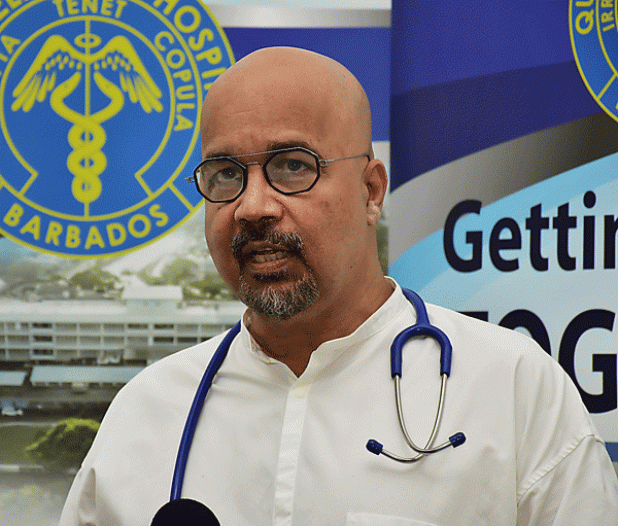
Director of Medical Services at the Queen Elizabeth Hospital (QEH), Dr. Clyde Cave.
QEH state of affairs
At the end of the second wave of COVID cases in early 2021 and prior to the Government of Barbados’ drive to ensure expanded vaccine coverage, the Queen Elizabeth Hospital Board and management were advised by Director of Isolation Centres, Dr. Corey Forde to position itself to act should a more aggressive COVID-19 variant arrive on island.
Juliette Bynoe-Sutherland, Executive Chairman of the QEH, indicates this led to strategic planning and investments months in advance of the current surge, and allowed the QEH to reinforce the foundation of its COVID response and in so doing ensure the hospital’s operations would not buckle under the weight of the numerous demands being placed upon it. Bynoe-Sutherland stated “We have benefitted tremendously from the inspiring work and unrelenting commitment of a dedicated team of professionals in a range of various disciplines who applied their minds to the development of proactive and practical solutions needed to ensure the continuity of the QEH’s operations. In spite of any and all challenges faced, including the sheer scale and unprecedented personal impact this latest COVID-19 surge has had on patients, staff, and their families, our staff continue to prioritize the needs of this institution and its patients and for this we are eternally grateful.”
Director of Medical Services, Dr. Clyde Cave elaborated on the sentiments expressed by Bynoe-Sutherland, adding that “the hospital’s response was informed by lessons learnt both at the national level as well as by studying the COVID-19 responses of other healthcare institutions and countries”. He stated that the knowledge gained allowed for the implementation of innovative, forward thinking and practical solutions to many of the problems which plagued other hospitals and countries in the region.
Dr. Cave stated that significant changes were made across the continuum of the QEH to ensure the hospital was in a position to maintain both in-patient and out-patient services even with the decreased man-power available at QEH as medical and nursing staff were being redeployed to work at the isolation centres and the Accident and Emergency Department (AED). Some of these changes included the streamlining of in-patient services, the establishment of the QEH Help Desk and Pharmacy Delivery Service, restricted visiting hours and the implementation of the corresponding drop off and collection of personal care items system, the modification of the discharge planning procedure to increase efficiency, and the introduction of tele-medicine services.
Cave went on to share that the situation on the ground in other countries allowed the QEH to position itself to deal with the current national surge through the expansion of the AED and its division into a respiratory section for confirmed COVID positive patients and those presenting with symptoms, and a non-respiratory section for those who are COVID negative. Cave also added that due to the limited bed spaces available in the AED, and the rising number of COVID positive persons presenting to the Department, a strategic decision was made for the installation of over-flow tents with 40 additional oxygen stations outside of the AED in of the event of an influx of COVID positive patients who needed to be stabilized prior to transport to an isolation centre.
He noted that even with reduced medical and nursing resources available, the QEH has been able to maintain non-COVID related services and treatments such as non-communicable diseases, accidents and other emergencies, but that these services for example, surgical procedures, may experience a gradual slowing down due to the decrease in man-power. Cave surmised that a need existed for additional staff and security personnel to be recruited and that this was being actively addressed by the hospital’s Human Resources Department to mitigate any staffing shortages.
Cave said that due to the current COVID crisis and the closure of the 24 hour Winston Scott Polyclinic on Saturday, October 9 as a result of the untimely passing of a member of its healthcare team that the general public should be reminded that only persons experiencing medical urgencies and emergencies should visit the AED. Dr. Joanne Bradford-King, Consultant Head of the AED explained that “the department is experiencing an influx of critically ill patients and as such will be unable to continue providing care to patients with mild COVID-19 symptoms, non-emergencies, and those who may only require testing.” She went on to say that “all persons who come to the Department will continue to be assessed by a medical professional. However, if their condition is found to be non-life-threatening these patients will be referred to another healthcare facility.”
Dr. Cave assured the public that the QEH and by extension its AED will continue to provide patients with the best care possible, and asks that those who believe they may require emergency or urgent medical care contact the QEH Help Desk at 536-4800 or send an email to helpdesk@qeh.gov.bb for guidance before visiting the AED.
The QEH Help Desk is open from 7:00 a.m. to 11:00 p.m. daily and is manned by trained medical professionals.
